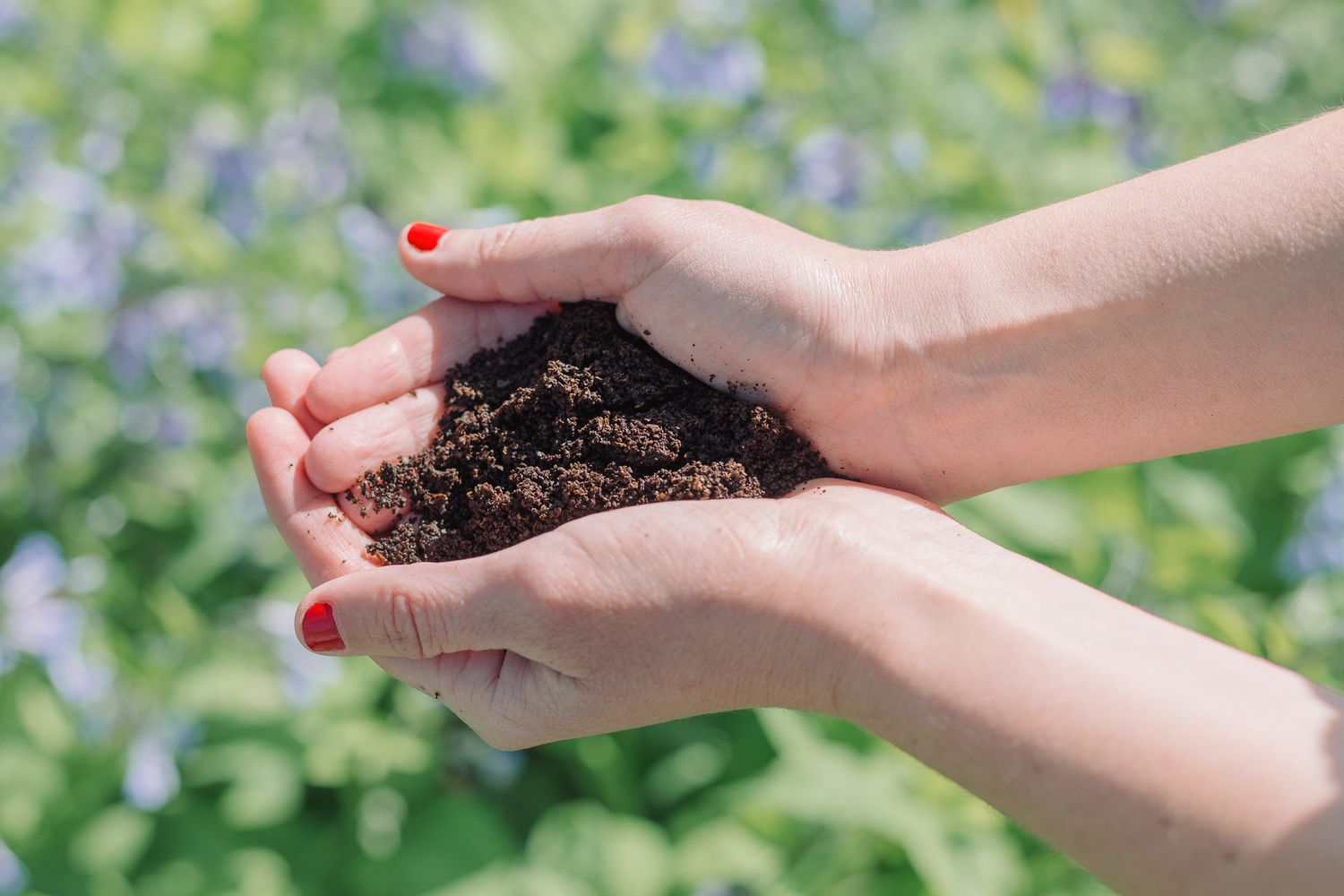Home>Home and Garden>Using Coffee Grounds For Roses: Benefits And Effects


Home and Garden
Using Coffee Grounds For Roses: Benefits And Effects
Published: February 19, 2024
Discover the benefits of using coffee grounds for roses in your home and garden. Learn about the positive effects and how to maximize their potential for your plants.
(Many of the links in this article redirect to a specific reviewed product. Your purchase of these products through affiliate links helps to generate commission for Noodls.com, at no extra cost. Learn more)
Table of Contents
Introduction
Roses are renowned for their timeless beauty and captivating fragrance, making them a beloved addition to any garden. Whether you are a seasoned gardener or a novice enthusiast, nurturing these exquisite blooms can be a rewarding experience. While there are numerous methods to care for roses, one unconventional yet effective approach involves utilizing coffee grounds. Yes, you read that right – coffee grounds, the byproduct of your morning brew, can serve as a valuable resource for enhancing the health and vitality of your roses.
In recent years, the practice of using coffee grounds in gardening has gained traction due to its eco-friendly nature and the array of benefits it offers to plants. When it comes to roses, coffee grounds can play a multifaceted role, providing nutritional benefits, improving soil quality, and even acting as a natural pest repellent. This innovative approach not only promotes sustainable gardening but also presents an opportunity to repurpose a common household waste product, thereby reducing environmental impact.
As we delve into the world of utilizing coffee grounds for roses, it's essential to understand the science behind this practice and the potential advantages it holds. From enriching the soil with essential nutrients to warding off pests, the application of coffee grounds can significantly contribute to the overall well-being of your rose bushes. Moreover, by incorporating this organic and cost-effective method into your gardening routine, you can embark on a journey to cultivate healthier, more vibrant roses while minimizing the reliance on synthetic fertilizers and chemical pesticides.
In the subsequent sections, we will explore the nutritional benefits of coffee grounds for roses, the soil conditioning effects they impart, and their natural pest repellent properties. Additionally, we will provide practical insights on how to effectively integrate coffee grounds into your rose care regimen, along with essential precautions to ensure optimal results. By the end of this comprehensive guide, you will be equipped with the knowledge and confidence to harness the potential of coffee grounds, elevating your rose gardening endeavors to new heights.
Nutritional Benefits of Coffee Grounds for Roses
Coffee grounds are a treasure trove of nutrients that can profoundly benefit the health and growth of roses. As a rich source of organic matter, coffee grounds contribute essential elements such as nitrogen, potassium, phosphorus, and other micronutrients to the soil. These nutrients play a pivotal role in bolstering the overall vitality of roses, fostering robust foliage, vibrant blooms, and resilient root systems.
Nitrogen, a key component of coffee grounds, is fundamental for promoting lush, green foliage in roses. This vital nutrient facilitates the synthesis of chlorophyll, the pigment responsible for the plant's green color, and plays a crucial role in photosynthesis, the process through which plants convert light energy into chemical energy. By incorporating nitrogen-rich coffee grounds into the soil, gardeners can effectively support the development of healthy leaves and stems, enhancing the aesthetic appeal of their rose bushes.
Furthermore, the presence of potassium in coffee grounds contributes to the overall vigor and resilience of roses. Potassium aids in regulating water uptake and retention within plant cells, thereby promoting drought tolerance and reducing the susceptibility to wilting. Additionally, this essential nutrient plays a pivotal role in bolstering the plant's immune system, enabling roses to combat environmental stressors and resist diseases more effectively.
Phosphorus, another vital component found in coffee grounds, is instrumental in stimulating robust root development in roses. This nutrient is essential for energy transfer within the plant, facilitating the conversion of sunlight into chemical energy and promoting the growth of healthy, extensive root systems. By fortifying the root structure, phosphorus-rich coffee grounds empower roses to efficiently absorb water and nutrients from the soil, ensuring optimal nourishment and resilience against adverse conditions.
In addition to these primary nutrients, coffee grounds also contain trace elements such as magnesium, calcium, and copper, which play diverse roles in supporting the overall health and functionality of roses. Magnesium contributes to chlorophyll production and enzyme activation, while calcium aids in cell wall formation and structural integrity. Copper, although required in smaller quantities, is crucial for enzyme function and plays a role in disease resistance.
By harnessing the nutritional richness of coffee grounds, gardeners can provide their roses with a holistic and balanced diet, fostering robust growth, vibrant blooms, and enhanced resilience to environmental stressors. This natural approach not only promotes the well-being of roses but also aligns with sustainable gardening practices, offering a compelling alternative to synthetic fertilizers while minimizing environmental impact.
Soil Conditioning Effects of Coffee Grounds
Coffee grounds possess remarkable soil conditioning effects that can revolutionize the health and fertility of the soil in which roses thrive. When integrated into the soil, coffee grounds act as a natural amendment, enriching the earth with organic matter and fostering a hospitable environment for robust plant growth.
One of the most notable contributions of coffee grounds to soil conditioning is their ability to enhance soil structure. The organic matter present in coffee grounds serves as a valuable soil conditioner, improving its texture and promoting optimal aeration. This, in turn, facilitates the circulation of air and water within the soil, creating a conducive environment for the development of healthy root systems in roses. By mitigating compaction and enhancing drainage, coffee grounds contribute to the prevention of waterlogging and the promotion of optimal moisture levels, crucial for the well-being of roses.
Moreover, the gradual decomposition of coffee grounds in the soil releases valuable nutrients and organic compounds, enriching the earth with a steady supply of nourishment for roses. As the coffee grounds break down, they contribute to the enhancement of soil fertility, promoting the availability of essential elements for plant uptake. This sustained release of nutrients not only supports the immediate nutritional needs of roses but also fosters long-term soil health, laying the foundation for sustained growth and vitality.
In addition to improving soil structure and fertility, coffee grounds also play a pivotal role in regulating soil pH levels. Roses thrive in slightly acidic to neutral soil conditions, and the application of coffee grounds can aid in maintaining an optimal pH range. As coffee grounds decompose, they release organic acids into the soil, gradually lowering its pH. This natural acidification can be particularly beneficial for roses, as it aligns with their preference for mildly acidic growing conditions, promoting the uptake of essential nutrients and supporting overall health and vigor.
Furthermore, the presence of coffee grounds in the soil contributes to the suppression of certain soil-borne pathogens and pests, owing to their natural antimicrobial and pest-repellent properties. This can help in safeguarding the health of roses and minimizing the risk of disease infestations, contributing to a thriving and resilient garden ecosystem.
By leveraging the soil conditioning effects of coffee grounds, gardeners can cultivate an environment that is conducive to the flourishing of roses, promoting optimal growth, resilience, and overall well-being. This natural and sustainable approach not only enhances the health of roses but also fosters a harmonious and balanced garden ecosystem, aligning with the principles of eco-friendly and mindful gardening practices.
Pest Repellent Properties of Coffee Grounds
In addition to their nutritional and soil conditioning benefits, coffee grounds exhibit natural pest repellent properties that can serve as a valuable line of defense for roses. The aromatic compounds and chemical constituents present in coffee grounds act as a deterrent against certain pests, contributing to the protection of roses and the maintenance of a healthy garden ecosystem.
One of the primary mechanisms through which coffee grounds repel pests is their strong aroma, which can act as a natural deterrent for insects. Many common garden pests, such as ants, slugs, and snails, are sensitive to strong scents, and the pungent aroma of coffee grounds can discourage their presence in the vicinity of roses. By creating an olfactory barrier, coffee grounds can help deter these pests from approaching and potentially damaging the delicate foliage and blooms of roses.
Moreover, the texture of coffee grounds can pose a physical deterrent to certain pests, particularly slugs and snails. These soft-bodied pests are a common nuisance in gardens, known for their voracious appetite for tender plant foliage. When scattered around the base of rose bushes, coffee grounds create an abrasive and challenging terrain for these pests to navigate, deterring their movement and reducing the likelihood of damage to the plants.
Furthermore, the chemical composition of coffee grounds contributes to their pest-repellent properties. Caffeine, a naturally occurring compound in coffee, has been found to have toxic effects on certain insects and pests. When incorporated into the soil or applied as a top dressing, the presence of caffeine in coffee grounds can deter pests and inhibit their feeding behavior, offering a natural and eco-friendly method of pest control for roses.
Additionally, the decomposition of coffee grounds in the soil releases organic acids and compounds that can contribute to the suppression of certain soil-borne pests and pathogens. This natural antimicrobial effect can help safeguard the root systems of roses and mitigate the risk of soil-borne diseases, promoting the overall health and resilience of the plants.
By harnessing the pest-repellent properties of coffee grounds, gardeners can adopt a natural and sustainable approach to pest management, reducing reliance on chemical pesticides and fostering a balanced garden ecosystem. This eco-friendly method not only protects roses from potential damage but also contributes to the preservation of beneficial insects and the overall harmony of the garden environment.
How to Use Coffee Grounds for Roses
Integrating coffee grounds into your rose care routine is a simple yet impactful process that can significantly enhance the health and vitality of your beloved blooms. By following these practical guidelines, you can harness the potential of coffee grounds and maximize their benefits for your roses.
-
Collection and Preparation: Begin by collecting used coffee grounds from your daily brewing routine. Ensure that the coffee grounds have been allowed to cool and are free from any additives such as sugar or cream. It's important to use coffee grounds in moderation, as excessive amounts can potentially alter the pH of the soil. Aim to gather a sufficient but balanced quantity to apply to your rose garden.
-
Application: Once you have accumulated a suitable amount of coffee grounds, it's time to apply them to the soil around your rose bushes. Begin by spreading a thin layer of coffee grounds around the base of each plant, ensuring that the application is even and does not form dense clumps. Take care to avoid direct contact between the coffee grounds and the stems or foliage of the roses, as this can potentially lead to moisture retention and create a favorable environment for fungal growth.
-
Incorporation into the Soil: After applying the coffee grounds as a top dressing, gently incorporate them into the soil using a hand rake or garden fork. This will facilitate the gradual breakdown of the coffee grounds and the release of nutrients into the soil. Avoid excessive disturbance to the root systems of the roses while incorporating the coffee grounds, ensuring that the process is carried out with a gentle touch.
-
Watering and Monitoring: Following the application of coffee grounds, water the soil around the rose bushes to facilitate the integration of the coffee grounds and promote their gradual decomposition. It's essential to monitor the moisture levels in the soil to prevent waterlogging, especially in areas where coffee grounds have been applied. Regular observation of the plants will allow you to assess their response to the coffee grounds and make any necessary adjustments to the application.
-
Reapplication and Frequency: As the coffee grounds decompose and dissipate into the soil, periodic reapplication can be beneficial to maintain a steady supply of nutrients for the roses. However, it's important to exercise moderation and avoid excessive accumulation of coffee grounds, as this can lead to imbalances in soil pH and nutrient levels. Aim for a balanced and consistent approach to reapplication, taking into account the specific needs of your rose garden.
By following these simple yet effective steps, you can seamlessly incorporate coffee grounds into your rose care regimen, harnessing their nutritional, soil conditioning, and pest-repellent benefits. This natural and sustainable approach not only promotes the well-being of your roses but also aligns with eco-friendly gardening practices, offering a compelling alternative to synthetic fertilizers and chemical pesticides. Embrace the potential of coffee grounds and embark on a journey to cultivate healthier, more vibrant roses, enriching your gardening experience with sustainable and mindful practices.
Precautions and Considerations
When incorporating coffee grounds into your rose care routine, it is essential to be mindful of certain precautions and considerations to ensure optimal results and safeguard the well-being of your plants. While coffee grounds offer a myriad of benefits, it is important to approach their usage with attentiveness and a clear understanding of potential implications.
Moderation and Balance
The application of coffee grounds should be approached with moderation and balance. Excessive accumulation of coffee grounds around rose bushes can lead to imbalances in soil pH levels and nutrient concentrations, potentially impacting the overall health of the plants. It is advisable to apply coffee grounds in a thin, even layer and monitor their effects on the soil and plant health over time. By exercising restraint and attentiveness, gardeners can harness the benefits of coffee grounds while mitigating the risk of unintended consequences.
Soil pH Monitoring
As coffee grounds have the potential to gradually lower soil pH levels due to their acidic nature, it is important to monitor the pH of the soil in which roses are cultivated. Roses thrive in slightly acidic to neutral soil conditions, and excessive acidification can adversely affect their growth and nutrient uptake. Regular soil testing can provide valuable insights into the pH dynamics, enabling gardeners to make informed decisions regarding the application of coffee grounds and the maintenance of optimal soil conditions for roses.
Moisture Management
The application of coffee grounds to the soil requires careful attention to moisture management. Coffee grounds have the capacity to retain moisture, and when applied in excessive quantities, they can contribute to waterlogging and hinder the aeration of the soil. It is crucial to monitor the moisture levels in the soil following the application of coffee grounds and adjust watering practices as needed to prevent potential water-related issues. By maintaining balanced moisture levels, gardeners can ensure that the benefits of coffee grounds are maximized without compromising the overall soil health.
Consideration of Plant Sensitivity
While coffee grounds offer numerous benefits, it is important to consider the sensitivity of individual rose varieties to certain elements present in coffee grounds. Some rose cultivars may exhibit varying degrees of sensitivity to specific nutrients or compounds found in coffee grounds. By observing the response of roses to the application of coffee grounds and being attentive to any signs of sensitivity or adverse effects, gardeners can tailor their approach to suit the unique needs of their plants, ensuring that the benefits of coffee grounds are optimized without causing undue stress to the roses.
Integration with Existing Practices
Gardeners should consider the integration of coffee grounds with their existing gardening practices and routines. Understanding how coffee grounds complement other soil amendments, fertilizers, and pest management strategies is crucial for achieving a harmonious and effective approach to rose care. By aligning the application of coffee grounds with existing practices and considering their interactions with other gardening inputs, gardeners can optimize the overall impact of coffee grounds on the health and vitality of their roses.
By taking these precautions and considerations into account, gardeners can harness the potential of coffee grounds while ensuring that their application aligns with the specific needs of their rose garden. With attentiveness, moderation, and a clear understanding of the implications, the integration of coffee grounds can contribute to the cultivation of healthier, more vibrant roses, enriching the gardening experience with sustainable and mindful practices.
Conclusion
In conclusion, the utilization of coffee grounds for roses presents a multifaceted and sustainable approach to nurturing these beloved blooms. From the nutritional benefits that enrich the soil to the natural pest-repellent properties and soil conditioning effects, coffee grounds offer a holistic solution for promoting the health and vitality of roses. By integrating coffee grounds into the gardening routine, enthusiasts can embark on a journey towards sustainable and mindful rose care, aligning with eco-friendly practices while fostering vibrant and resilient blooms.
The nutritional richness of coffee grounds, encompassing essential elements such as nitrogen, potassium, phosphorus, and trace minerals, provides roses with a balanced and holistic diet. This natural source of nutrients supports robust foliage, vibrant blooms, and resilient root systems, contributing to the overall well-being of the plants. Furthermore, the gradual release of nutrients from decomposing coffee grounds fosters long-term soil fertility, laying the groundwork for sustained growth and vitality.
In addition to the nutritional benefits, the soil conditioning effects of coffee grounds play a pivotal role in creating a hospitable environment for roses. By enhancing soil structure, promoting optimal aeration, and regulating pH levels, coffee grounds contribute to the creation of an ideal growing medium for roses. This fosters healthy root development, mitigates the risk of waterlogging, and promotes the uptake of essential nutrients, laying the foundation for robust and resilient plants.
Moreover, the natural pest-repellent properties of coffee grounds offer a compelling alternative to chemical pesticides, safeguarding roses from potential damage while preserving the balance of the garden ecosystem. The aromatic compounds, physical deterrents, and natural acids present in coffee grounds contribute to the deterrence of pests, offering a sustainable and eco-friendly method of pest management.
By following the practical guidelines for the application of coffee grounds and being mindful of the necessary precautions, gardeners can seamlessly integrate this natural resource into their rose care regimen. With moderation, attentiveness, and a clear understanding of the implications, the benefits of coffee grounds can be maximized while ensuring the well-being of the roses.
In essence, the incorporation of coffee grounds into rose care represents a harmonious synergy between sustainable practices and the nurturing of vibrant and resilient blooms. By embracing this natural and eco-friendly approach, gardeners can cultivate a garden ecosystem that thrives on mindful and sustainable practices, enriching the gardening experience and fostering the enduring beauty of roses.













